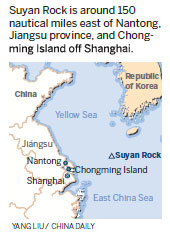China, ROK to open maritime boundary talks
Beijing and Seoul will begin their first round of maritime demarcation talks in the Chinese capital on Friday, aiming to resolve overlapping claims through negotiation.
Foreign Ministry spokeswoman Hua Chunying confirmed the schedule at a regular news briefing on Thursday.
"To fairly and properly demarcate the China-ROK maritime boundary through negotiations and consultations is of great significance to upholding tranquillity and stability of the waters and to consolidating and growing friendly bilateral cooperation," Hua said.
She said she hoped that China and the Republic of Korea will set a good example for regional countries in addressing similar issues.
China and the ROK have overlapping claims on exclusive economic zones, one of the few concerns in their thriving relations.
President Xi Jinping and his ROK counterpart Park Geunhye agreed to start the talks in July 2014 during Xi's visit to the ROK.
Beijing believes that the ownership of Suyan Rock, a submerged feature in the East China Sea in the exclusive economic zones claimed by both China and the ROK, should be determined through negotiation. The countries agree that the rock does not have territorial status, the Foreign Ministry has said.
Zhang Liangui, an expert in Korean studies at the Party School of the Central Committee of the Communist Party of China, said the absence of maritime demarcation between the two neighbors has resulted in numerous disputes, mainly involving fishing vessels.
"Despite the disputes, the two countries share a good political atmosphere, while top leaders of both have made clear that cooperation is the key to the demarcation issue," Zhang said.
However, he added, any settlement will be a long-term process.
Shi Yongming, an Asia-Pacific studies researcher at the China Institute of International Relations, noted that the talks come at the same time as discussions by Washington and Seoul about possible deployment of the advanced THAAD missile defense system in the ROK. The proposal has drawn great concern from China and Russia.
"And that makes it the right moment for us to do something positive," he said.

























